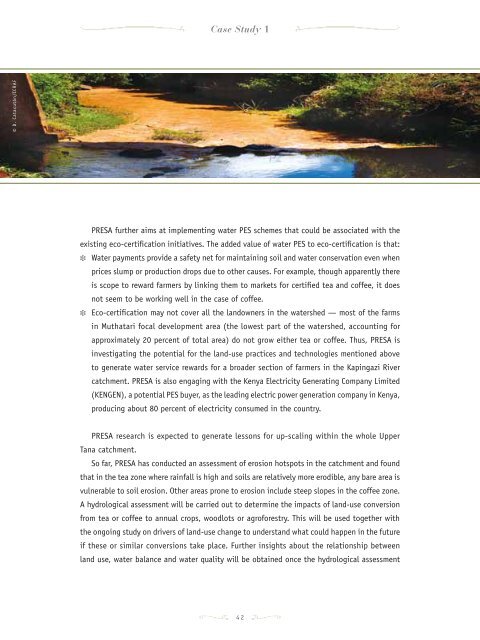agriculture and ecosystem services - Serena
agriculture and ecosystem services - Serena
agriculture and ecosystem services - Serena
Create successful ePaper yourself
Turn your PDF publications into a flip-book with our unique Google optimized e-Paper software.
Case Study 1©©D. Catacután/ICRAF!PRESA further aims at implementing water PES schemes that could be associated with theexisting eco-certification initiatives. The added value of water PES to eco-certification is that:❉❉Water payments provide a safety net for maintaining soil <strong>and</strong> water conservation even whenprices slump or production drops due to other causes. For example, though apparently thereis scope to reward farmers by linking them to markets for certified tea <strong>and</strong> coffee, it doesnot seem to be working well in the case of coffee.❉❉Eco-certification may not cover all the l<strong>and</strong>owners in the watershed — most of the farmsin Muthatari focal development area (the lowest part of the watershed, accounting forapproximately 20 percent of total area) do not grow either tea or coffee. Thus, PRESA isinvestigating the potential for the l<strong>and</strong>-use practices <strong>and</strong> technologies mentioned aboveto generate water service rewards for a broader section of farmers in the Kapingazi Rivercatchment. PRESA is also engaging with the Kenya Electricity Generating Company Limited(KENGEN), a potential PES buyer, as the leading electric power generation company in Kenya,producing about 80 percent of electricity consumed in the country.PRESA research is expected to generate lessons for up-scaling within the whole UpperTana catchment.So far, PRESA has conducted an assessment of erosion hotspots in the catchment <strong>and</strong> foundthat in the tea zone where rainfall is high <strong>and</strong> soils are relatively more erodible, any bare area isvulnerable to soil erosion. Other areas prone to erosion include steep slopes in the coffee zone.A hydrological assessment will be carried out to determine the impacts of l<strong>and</strong>-use conversionfrom tea or coffee to annual crops, woodlots or agroforestry. This will be used together withthe ongoing study on drivers of l<strong>and</strong>-use change to underst<strong>and</strong> what could happen in the futureif these or similar conversions take place. Further insights about the relationship betweenl<strong>and</strong> use, water balance <strong>and</strong> water quality will be obtained once the hydrological assessment42


